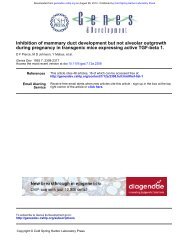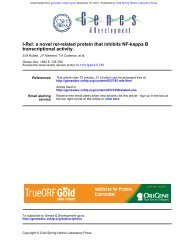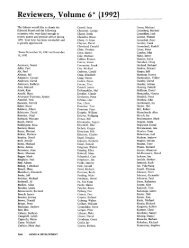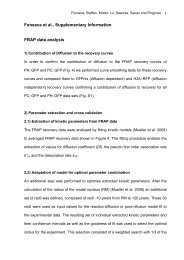Pancreatic cancers require autophagy for tumor growth - Genes ...
Pancreatic cancers require autophagy for tumor growth - Genes ...
Pancreatic cancers require autophagy for tumor growth - Genes ...
Create successful ePaper yourself
Turn your PDF publications into a flip-book with our unique Google optimized e-Paper software.
Downloaded from<br />
genesdev.cshlp.org on June 4, 2013 - Published by Cold Spring Harbor Laboratory Press<br />
<strong>Pancreatic</strong> <strong>cancers</strong> <strong>require</strong> <strong>autophagy</strong><br />
<strong>for</strong> <strong>tumor</strong> <strong>growth</strong><br />
Shenghong Yang, 1 Xiaoxu Wang, 1,11 Gianmarco Contino, 2,3,11 Marc Liesa, 4 Ergun Sahin, 5<br />
Haoqiang Ying, 5 Alexandra Bause, 6,7 Yinghua Li, 1 Jayne M. Stommel, 5 Giacomo Dell’Antonio, 8<br />
Josef Mautner, 9 Giovanni Tonon, 10 Marcia Haigis, 6,7 Orian S. Shirihai, 4 Claudio Doglioni, 8<br />
Nabeel Bardeesy, 2 and Alec C. Kimmelman 1,12<br />
1 Division of Genomic Stability and DNA Repair, Department of Radiation Oncology, Dana Farber Cancer Institute, Harvard<br />
Medical School, Boston, Massachusetts 02115, USA; 2 Cancer Center, Massachusetts General Hospital, Department of Medicine,<br />
Harvard Medical School, Boston, Massachusetts 02114, USA; 3 Division of General Surgery, European Institute of Oncology,<br />
University of Milan, 20141 Milan, Italy; 4 Department of Medicine, Obesity Research Center, Boston University School<br />
of Medicine, Boston, Massachusetts 02118, USA; 5 Department of Medical Oncology, Dana Farber Cancer Institute, Harvard<br />
Medical School, Boston, Massachusetts 02115, USA; 6 Department of Cell Biology, Harvard Medical School, Boston,<br />
Massachusetts 021145, USA; 7 Department of Pathology, Harvard Medical School, Boston, Massachusetts 021145, USA;<br />
8 Department of Pathology, San Raffaele del Monte Tabor Scientific Institute, 20132 Milan, Italy; 9 Helmholtz-Zentrum and<br />
Technische Universität München, D-81377 München, Germany; 10 Division of Molecular Oncology, San Raffaele del Monte<br />
Tabor Scientific Institute, 20132 Milan, Italy<br />
Macro<strong>autophagy</strong> (<strong>autophagy</strong>) is a regulated catabolic pathway to degrade cellular organelles and macromolecules.<br />
The role of <strong>autophagy</strong> in cancer is complex and may differ depending on <strong>tumor</strong> type or context. Here we show that<br />
pancreatic <strong>cancers</strong> have a distinct dependence on <strong>autophagy</strong>. <strong>Pancreatic</strong> cancer primary <strong>tumor</strong>s and cell lines show<br />
elevated <strong>autophagy</strong> under basal conditions. Genetic or pharmacologic inhibition of <strong>autophagy</strong> leads to increased<br />
reactive oxygen species, elevated DNA damage, and a metabolic defect leading to decreased mitochondrial<br />
oxidative phosphorylation. Together, these ultimately result in significant <strong>growth</strong> suppression of pancreatic<br />
cancer cells in vitro. Most importantly, inhibition of <strong>autophagy</strong> by genetic means or chloroquine treatment leads<br />
to robust <strong>tumor</strong> regression and prolonged survival in pancreatic cancer xenografts and genetic mouse models.<br />
These results suggest that, unlike in other <strong>cancers</strong> where <strong>autophagy</strong> inhibition may synergize with chemotherapy<br />
or targeted agents by preventing the up-regulation of <strong>autophagy</strong> as a reactive survival mechanism, <strong>autophagy</strong> is<br />
actually <strong>require</strong>d <strong>for</strong> <strong>tumor</strong>igenic <strong>growth</strong> of pancreatic <strong>cancers</strong> de novo, and drugs that inactivate this process may<br />
have a unique clinical utility in treating pancreatic <strong>cancers</strong> and other malignancies with a similar dependence on<br />
<strong>autophagy</strong>. As chloroquine and its derivatives are potent inhibitors of <strong>autophagy</strong> and have been used safely in<br />
human patients <strong>for</strong> decades <strong>for</strong> a variety of purposes, these results are immediately translatable to the treatment of<br />
pancreatic cancer patients, and provide a much needed, novel vantage point of attack.<br />
[Keywords: pancreatic cancer; <strong>autophagy</strong>; Kras; chloroquine; DNA damage; metabolism]<br />
Supplemental material is available <strong>for</strong> this article.<br />
Received November 24, 2010; revised version accepted February 7, 2011.<br />
<strong>Pancreatic</strong> cancer is highly lethal, with >40,000 cases<br />
diagnosed each year (Jemal et al. 2010). Un<strong>for</strong>tunately,<br />
the lack of effective treatment options and late diagnosis<br />
results in a dismal 5-year survival of ;5% (Hezel et al.<br />
2006). These <strong>tumor</strong>s show an intense therapeutic resistance<br />
to cytotoxic chemotherapies, targeted agents, and<br />
radiotherapy (Li et al. 2004; Ben-Josef and Lawrence 2008;<br />
Brus and Saif 2010). This extreme resistance to a variety<br />
of therapies points to altered cell survival and metabolic<br />
11 These authors contributed equally to this work.<br />
12 Corresponding author.<br />
E-MAIL alec_kimmelman@dfci.harvard.edu; FAX (617) 582-8213.<br />
Article published online ahead of print. Article and publication date are<br />
online at http://www.genesdev.org/cgi/doi/10.1101/gad.2016111.<br />
pathways in these refractory <strong>cancers</strong>. Although pancreatic<br />
ductal adenocarcinoma (PDAC) has a well-defined<br />
spectrum of highly recurrent oncogenic lesions—such as<br />
activation of KRAS and loss/silencing/mutation of p53,<br />
INK4A/ARF, and SMAD4—this in<strong>for</strong>mation has yet to be<br />
translated into effective therapies <strong>for</strong> the disease (<strong>for</strong><br />
review, see Hezel et al. 2006). Activating KRAS mutations<br />
are present in the great majority of cases, making<br />
this an ideal target <strong>for</strong> therapeutic intervention. Un<strong>for</strong>tunately,<br />
effective KRAS inhibitors have yet to be developed<br />
(Van Cutsem et al. 2004). The inhibition of pathways<br />
downstream from KRAS is a potentially viable<br />
approach to circumventing the difficulties in KRAS inhibition<br />
(Engelman et al. 2008). However, KRAS has<br />
GENES & DEVELOPMENT 25:717–729 Ó 2011 by Cold Spring Harbor Laboratory Press ISSN 0890-9369/11; www.genesdev.org 717







